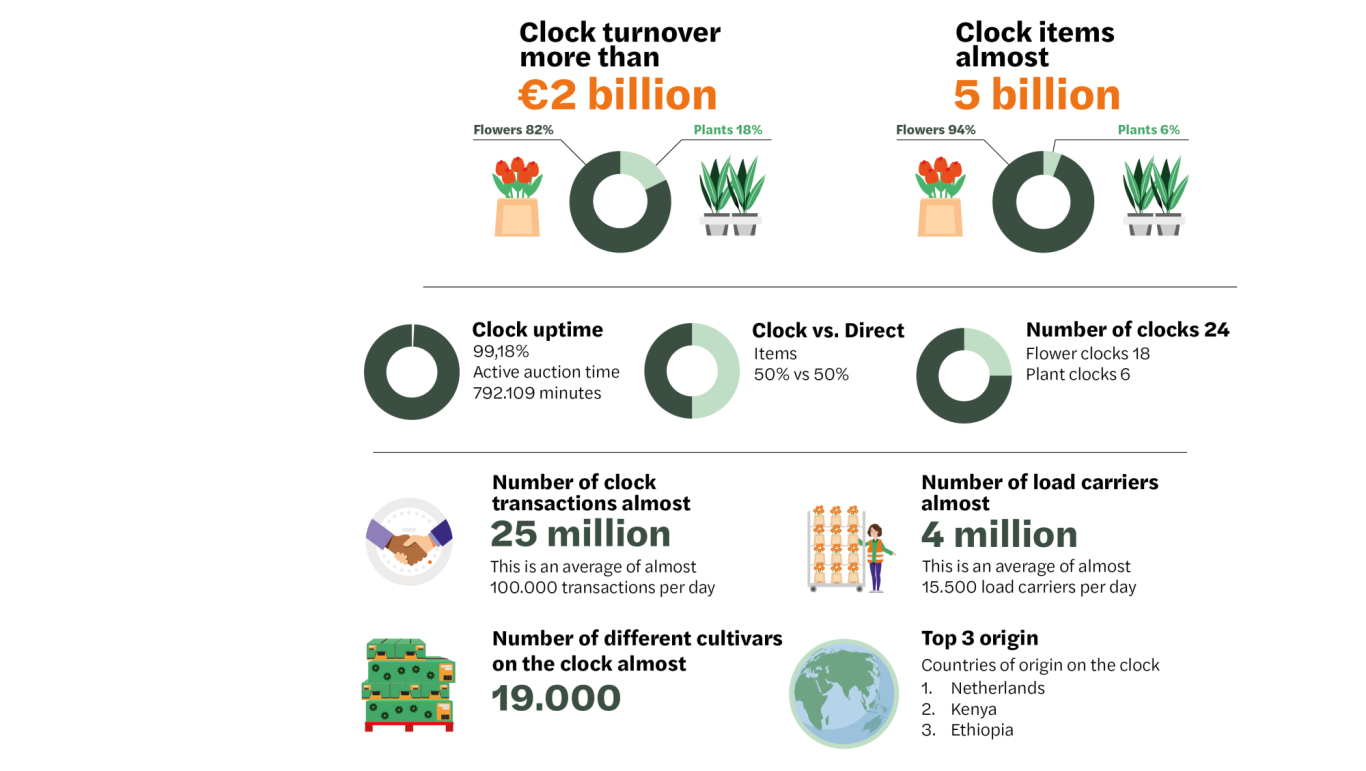Multi-transaction auctioning: buyers and growers benefit from accelerated auction process
September 15, 2025

Multi-transaction auctioning has been the new standard auction method since April 2025. The majority of buyers are positive. ‘Auctions are now a lot faster.’
With multi-transaction auctioning (MTA), multiple transactions can be made at a single clock stop (up to a maximum of eight per clock stop). Previously, auctions were always conducted with single transactions, i.e. only one buyer per clock stop. This different way of auctioning was introduced as a pilot project in the summer of 2024 on rose clock C08. Step by step MTA was gradually tested and improved. In January 2025, it was officially introduced on all rose clocks and in April 2025 on all flower and plant clocks.
Accelerated auction process
On average, the auction time is now 15 to 20 minutes shorter, depending on the type of clock. A survey conducted after the introduction shows that most buyers are positive about MTA. Rose buyer Nico Zwaan from flower wholesaler Hoven & De Mooij is one of them. He was involved in the pilot from the start. ‘First of all, it's great that we as buyers were able to contribute our ideas during the process. I've been very positive about this from the start,’ says Nico. ‘The auction process is a lot faster. I'm very happy about that. For us, the faster we can fill our web shop, the sooner our customers can buy products.’
Obtaining the desired quantities more quickly
Multi-transaction auctioning sometimes requires a different way of working and thinking, says Nico. ‘Because a batch is sold faster, you have to be a bit more alert. Suppose I want to buy roses for 75 cents each, then it could be that everything is already gone at 85 cents. But that's also a matter of intuition, of experience. I have never missed out on a large batch that I absolutely wanted. Nowadays, I usually get the quantities I want more quickly. You just don't have to press the button as often."
Rest key
Another thing that took some getting used to was that the “rest” key works differently on MTA. If you use the “rest” key to request the rest and there are still some available after previous purchases have been processed, you will receive the number that is left. That may be (much) less than the number that was originally available. Nico: ‘That’s something I did have to get used to. If other buyers press “rest” earlier, you can end up empty-handed. But then again, that was also the case before. That's just how auctions work.’
Multiple buyers
Nico does add a small side note to the advantages he has experienced: ‘We are in the luxurious position of having three buyers, so we always get what we want. But I can imagine that it is more difficult for exporters or line drivers who purchase multiple products to keep an eye on all those clocks. Because the auction runs like an express train now, you can sometimes miss out.’
Not always the desired quantities
This is the experience of the smaller and medium-sized buyers. As a result, they are increasingly making more use of Auction Pre-sales. On the one hand, because it reduces purchasing pressure, and on the other hand, because it guarantees they'll get the products they want. This is also the experience of Ronald van Norde of Agora Group. ‘Our buyers who purchase various products often work on multiple screens. Because the auction time is so much shorter, we sometimes miss something. As a result, we don't always have the desired quantities. We also don't yet find the time saved by multi-transaction auctioning to be significant. I can imagine that suppliers and growers are very happy with this way of auctioning.’
More realistic pricing
Leon van der Linden of nursery SK Roses confirms this: ’Multi-transaction auctioning makes the auction process more efficient and faster. This benefits both buyers and us as growers. We also believe that it generates a more realistic price image,’ says Leon. Initial studies show that there is a slight positive effect on price stability.
More time for relationships
While Agora Group hasn’t yet noticed the time saved, Nico van Hoven & De Mooij is more positive about it. ‘We don't have to spend as much time at the auction. Which is nice, because I used to be at the auction until eleven o'clock. By then, you're pretty fed up... Now I can spend that time building relationships with customers and growers. We used to meet at the auction, but now I'm often at the office. Thanks to the more efficient auctioning, I can maintain those contacts a little more. That's always good for business.’
Do you have any questions about multi-transaction auctioning? Take a look at the practical information about how multi-transaction auctioning works. Or contact our colleagues at the Customer Contact Centre.
-
Did you find this interesting?
Then share this article


